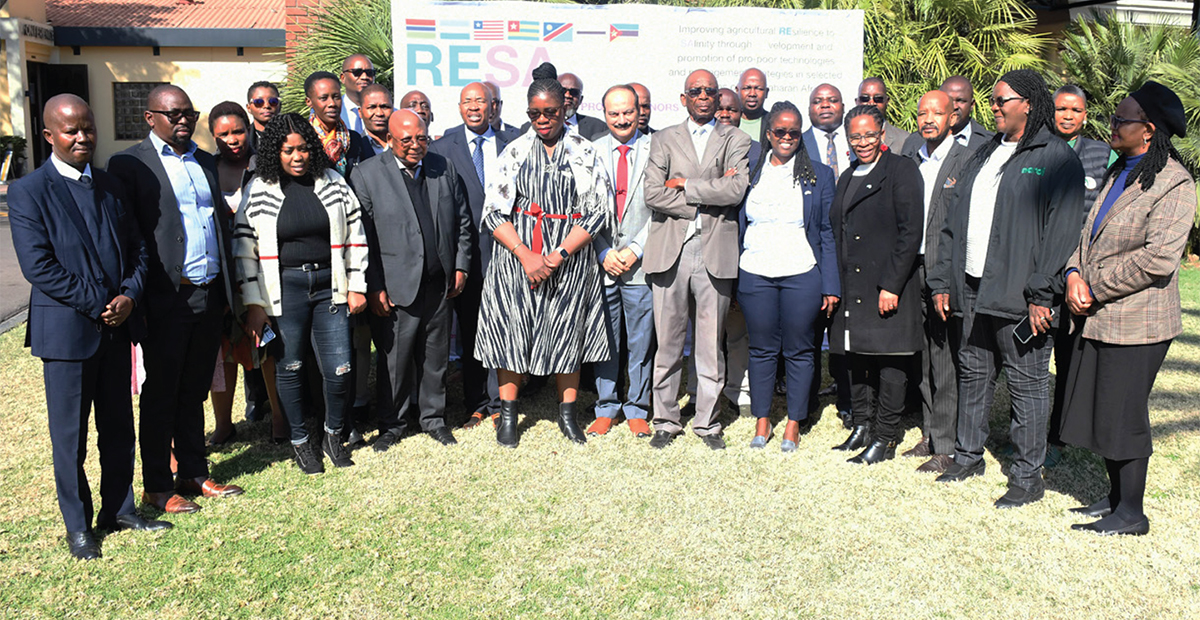NARDI hosts RESADE high level stakeholder meeting

On Friday, 19 July, 2024, National Agricultural Research and Development Institution (NARDI), held RESADE Project High Level Stakeholders’ Meeting for Botswana at Grand Palm Hotel in Gaborone.
The event was meant to share RESADE success stories with high level policy makers, so that the best options can be incorporated into the national plan and policies for the benefit of local farmers.
The RESADE Project is implemented in Botswana by NARDI, with the initiative seeking to: ‘Improve agricultural REsilience to SAlinity through DEvelopment and promotion of pro-poor technologies and management strategies in selected countries of sub-Saharan Africa (RESADE)’.
The project is run in partnership with the International Centre for Biosaline Agriculture (ICBA) based in Dubai, United Arab Emirates.
Botswana is one of the seven Sub Saharan African, central Asia and MENA region where salinization (accumulation of salt in land and water) of agricultural land is a growing problem, something the RESADE Project seeks to provide solutions to.
In his opening remarks, NARDI Acting Board Chairperson, Dr Mbatshi Mazwiduma explained that the project aims to improve food security and reduce poverty of smallholder farmers, particularly women in salinity-affected areas in Botswana.
“With this project we aim to take the research to the farmers. You would be aware that previously a lot of our research has been focused on our laboratories in our research areas in terms of our farms. The difference in our approach now is that we are doing needs-based research on site, in some instances with the farmers, primarily focused more on women and youth who are in farming or interested in farming,” he stated.
Permanent Secretary to the Ministry of Agriculture, Ms Nancy Chengeta expressed her delight at the project for supporting women and youth, which she noted is in line with government’s efforts.
“I am happy to note that this project is mainly targeting women and youth because even as Botswana government we acknowledge that women and youth need to be given more support. The project supports Social Development Goals (SDGs) Number 1, 2 and 5 and Vision 2036 Pillar 1 as well as PushaBW, which acts as enabler,” applauded Ms Chengeta.
She revealed that since Botswana became part of the project in 2021, over 600 individuals have benefited from training.
“To date, a total of 654 farmers have been trained in various crop management practices, strengthening cooperatives for technology dissemination and linking them to financial institutions, establishment of community seed banks, hands on fabrication of biochar units and making of biochar, hands on machinery use and maintenance and food safety and food processing,” she said.
Giving an overview of the scheme, Project Coordinator and ICBA rep, Dr. Rakesh Singh said the project has established knowledge hubs near farming communities, called best practice hubs (BPH).
“These hubs are acting as knowledge hubs and the experts from ICBA, in consultation with NARDI technical staff, are introducing different pro-poor technologies that can be easily emulated by the farmers. On the same hub, a small area has been allocated to the farmers so that they can replicate the technology by themselves to be sure for further use at their own field. The technologies are mostly suitable crops and their improved varieties, amendments like biochar, irrigations systems, mechanization support, and community seed bank development besides large-scale capacity building on different technologies, with special emphasis on women farmers. All of these technologies are not rocket science but just simple, effective pro-poor technologies that can be adopted very easily,” highlighted Dr. Singh.
The project is funded by International Fund for Agricultural Development (IFAD) and the Arab Bank for Economic Development in Africa (BADEA) and is expected to run until 2026.